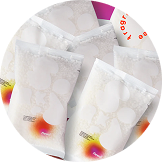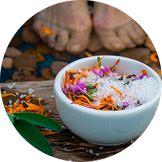It seems stress is inescapable. From work to relationships, making ends meet to the existential nature of life, it’s everywhere you look. It can have detrimental effects on your physical and mental wellbeing, sometimes, manifesting itself in strange ways.
So can stress cause sore muscles? If so, why does stress cause sore muscles? Unfortunately, this is a very common symptom of stress. It’s the result of your body’s fight or flight response constantly having to work.
Stress releases cortisol and adrenaline, both of which can tire out your muscles. Prolonged tension tends to do the most damage in the neck, back, and shoulders, but you may feel muscle soreness from stress anywhere else in your body too.
To make matters worse, the physical soreness is only one symptom of stress. From the toll it takes on your mental health to your immune system, sleep quality, digestion, and more - it’s clear you need a way to manage stress.
You’ve come to the right place. We’ll share tips on alleviating sore muscles from stress below, including our stress relief bath soak formulations here at Flewd Stresscare. We combine magnesium with vitamins, other minerals, and nootropics to stop stress at the source.
The best part? You’ll finally feel at ease, with effects lasting up to 5 days! Learn more about stress and sore muscles below, including some of the most common stress triggers.
Common Triggers of Stress
As problematic as it may be, stress is actually a natural response to the challenges and demands all around you in everyday life. It’s ingrained in us as a primal survival instinct.
While it’s what kept our ancestors alive, it’s also what makes simple challenges like giving a presentation at work or having a difficult conversation with a friend so scary today.
Prolonged exposure to stress can lead to negative effects on both physical and mental health. So, what are some of the most typical triggers for your body’s fight-or-flight response?
- Workplace Pressure: Tight deadlines, high expectations, or job insecurity are among the most common sources of stress. The demands of achieving targets, managing colleague relationships, and balancing a heavy workload create ongoing tension.
- Financial Concerns: Whether it’s budgeting, unexpected expenses, or saving for future goals, financial uncertainty weighs heavily on just about everyone - even those who are doing well financially.
- Health Issues: It could be personal health concerns or something going on with loved ones. Either way, chronic illnesses, sudden medical conditions, or even the uncertainty around health can lead to anxiety and a constant feeling of unease.
- Relationship Challenges: Personal connections with family, friends, and romantic partners are the foundation of a purposeful life - but can cause stress. Poor communication, differing expectations, or unresolved conflicts create tension and stress that can bleed into other areas of your life.
- Life Transitions: Be it moving to a new place, starting a new job, or adjusting to lifestyle changes, any disruption to your routine is liable to lead to stress as you navigate unfamiliar situations and adapt to change.
There’s a good chance you’re juggling a lot in your life, which means you might be fighting stress from more than one source. It all starts to add up and become unbearable, especially as the physical symptoms set in. So can stress cause sore muscles?
Can Stress Cause Sore Muscles?
Yes - if you find that your muscles are sore for no apparent reason, it could be linked to stress. But a better question is, why does stress cause sore muscles? We’ll take a closer look at the relationship between stress and sore muscles below.
Why Does Stress Cause Sore Muscles?
Stress triggers a complex bodily response where hormones like adrenaline and cortisol are released. This is a survival mechanism, but the vast majority of stress is not related to life-or-death situations.
Your nervous system signals the body to prepare for action when a stress trigger presents itself. This causes muscles to tighten in anticipation. While it may not have an effect on one-off cases of stress, it’s the consistency of stress that poses a problem.
Over time, that tension begins to accumulate in the neck, shoulders, and lower back. If you don’t find ways to release it, soreness and fatigue quickly begin to set in.
Cortisol is also released in prolonged instances of stress. This weakens muscle recovery by promoting inflammation and reducing protein synthesis, two things that can hold your body back from repairing strained or tensed muscles.
Stress also has a negative impact on posture. You might have found yourself inadvertently clenching your jaw, balling up your fists, or hunching over. These all place strain on muscle groups in the neck, back, and arms.
This restricted movement limits circulation and in turn, deprives muscles of the oxygen and nutrients they need to heal. The end result is stiffness and discomfort.
Other Ways in Which Stress Impacts Wellbeing
So there are actually quite a few ways in which stress and sore muscles are connected. This is just one way in which stress impacts your health and happiness, too. Here are a few others:
- Mental Health Strain: Chronic stress is linked to anxiety, irritability, and depression. Constant exposure to stressors may alter the brain’s chemistry, making it harder to relax and recover mentally.
- Sleep Disruption: It’s hard to sleep when you can’t turn your mind off. Poor sleep quality impairs the body’s healing process and makes it harder to manage daily stress, creating a vicious cycle. You can’t sleep because you’re stressed, and then, you become more stressed because you can’t sleep!
- Immune System Weakness: Ongoing stress leaves the body more susceptible to infections. Your body diverts resources toward the stress response because it thinks it’s in peril - leaving little energy to regulate the immune system’s efficiency.
- Digestive Problems: Stomach cramps, nausea, and even conditions like IBS are linked to stress. Similar to the impact on your immune response, the body slows digestion to conserve energy for immediate threats when stressed.
- Cardiovascular Health Risks: Chronic stress can increase blood pressure and heart rate, straining the cardiovascular system. This elevates the risk of hypertension over time since the heart is constantly working in overdrive in response to stress hormones.
Any one of these ailments on its own warrants lifestyle change to manage stress. But considering all the different ways stress can affect your physical and mental health, it’s clear you need to do something.
So, let’s share some tips on alleviating sore muscles from stress - along with all the other common effects of stress for that matter!
Tips on Alleviating Sore Muscles From Stress
Stress is all around you and likely always will be. We say this to show that it’s essential to have stress-relieving techniques you can rely on rather than trying to run from stress. Healthy coping mechanisms and science-backed solutions help you live a life without the limitations of stress.
Still, it’s worth digging into the root cause of your stress and seeing if you can mitigate it at all. Let’s start there.
Start By Addressing the Root Cause of Stress
We encourage you to take inventory of your life and identify the things that stress you out the most. It could be work-related, personal, or situational sources of stress.
As radical as it may sound, see if you can eliminate these sources of stress. It could be as simple as practicing time management, setting boundaries, looking for a new job, cutting off toxic people in your life, and making you time a top priority.
Reducing instances of stress in your life is an obvious way to alleviate sore muscles from stress, but it can start to feel like a game of whack-a-mole. For every stress source you eliminate a new one may pop up.
That’s why you need to focus less on stress reduction, and more on stress management.
Fight Stress at the Source With Magnesium Bath Soaks
A magnesium bath soak is the best way to alleviate muscle soreness from stress. But, what is a bath soak? How are hot baths good for sore muscles in general, and how does magnesium help with stress?
Soaking in warm water dilates blood vessels. This can boost circulation and promote relaxation. Adding magnesium and other stress-busting ingredients enhances these effects further. But why is magnesium soak good for you from a stress standpoint?
This mineral plays an important role in more than 300 bodily processes, one of which is supporting a healthy response to stress. Magnesium also helps ease muscle tension directly while calming a racing mind. There are so many magnesium soak benefits.
But how can you unlock all the potential this solution has? Do you need to learn how to make magnesium bath soak? You can, but there’s a far better solution in store for you here at Flewd Stresscare.
We’ve created the most therapeutic bath soaks with 99% natural ingredients all centered around the most bioavailable form of magnesium, so you are soaking up relief with every second you spend in the tub.
You gain access to a variety of formulations based on the specific ailment you’re struggling with - be it anger, panic, anxiety, aches, insomnia, you name it. Our Stresscare Trio is the perfect pick. It features our three best defenses against stress:
- Anxiety Destroying Soak: Complex B vitamins and zinc help reduce anxiety and bring mental clarity.
- Ache Erasing Soak: Vitamins C and D help relieve muscle soreness, reduce inflammation, and aid muscle recovery.
- Insomnia Ending Soak: Vitamins A and E work to help promote relaxation and support restful sleep, helping your body recover overnight.
Each soak is designed with soothing scents to elevate relaxation, transforming your bath into a calming sanctuary. Learn more about how to use bath soak in our blog, but it’s simple - dump the contents into your tub, unwind for 30 minutes, and feel the effects firsthand!
Other Forms of Heat Therapy for Relaxation
We wholeheartedly believe our muscle bath soak and anxiety bath soak will work wonders to help you find your inner zen while alleviating the physical muscle soreness from stress.
But if you can’t use a hot bath to calm anxiety for any reason, heat therapy in general is a great choice. There are other options, like heating pads, warm compresses, or even a warm shower.
Each of these methods will target specific areas of soreness, relieving muscle tension and enhancing blood flow to soothe and relax tight muscles.
Stretching and Light Exercise to Loosen Things Up
Moving your body will kick up circulation bringing nutrients to the sore muscles and stimulating a healing response. This also helps take lactic acid away from the muscles so it can be excreted from the body.
There are many ways you can do this, from light stretching, walking, yoga, swimming - you name it. You don’t have to get in the gym and do grueling workouts that leave you more sore - unless you’re into that. Exercise does release endorphins and improve mood on its own, too!
Breathing Exercises and Meditation
Mindfulness practices have their place in a stress management routine as well. Simple breathing exercises signal your nervous system to relax. This reduces cortisol levels and helps muscles unwind, in turn calming sore muscles from stress.
Meditation may sound more scary and involved, but it can also be really simple with a guided session on your phone. Even short daily sessions can cultivate a sense of calm, alleviating the mental strain that manifests in physical soreness.
Regular Massage or Self-Massage Techniques
One of the best ways to release muscle soreness from stress is with physical manipulation. Massaging the muscles that are giving you grief can release painful muscle knots, improve circulation, and reduce tension.
Ideally, you’d book yourself a professional massage from an expert who knows what they’re doing. Otherwise, self-massage is a viable alternative. You can use your hands if possible, or resort to a foam roller or lacrosse ball.
The Role of Hydration and Diet
Dehydrated muscles are more prone to cramping and soreness, especially when under stress. Making sure you drink enough water can offset this issue while helping transport nutrients to the muscles and carrying toxins away.
Similarly, a balanced diet containing nutrients such as potassium, magnesium, and omega-3 fatty acids also helps keep muscles resilient. Maintaining a healthy diet is just good life advice in general, whether you’re stressed or not.
Wrapping Up Our Guide to Muscle Soreness From Stress
So, can stress cause sore muscles? In closing, stress and sore muscles are closely intertwined. Your body’s natural fight-or-flight response can often kick in for situations that really aren’t a matter of life or death, resulting in constant tension and soreness.
Fortunately, there are so many ways to address sore muscles from stress. From targeting the root cause to science-backed soaks, regular exercise, healthy diet, mindfulness, and more - the power to put stress in the past is in your hands.
Our blog has additional resources on magnesium soak vs epsom salt, sore muscle bath soak homemade, healing bath recipes, how long to soak in magnesium bath, does magnesium soak into skin, magnesium soak vs oral, and more.
But remember, the ultimate in physical and mental relaxation is only a click away at Flewd Stresscare. Discover a better path to managing muscle soreness from stress. Put stress on notice today!

























































